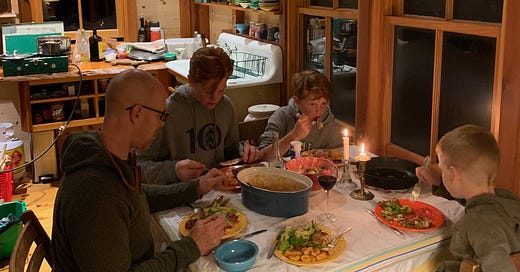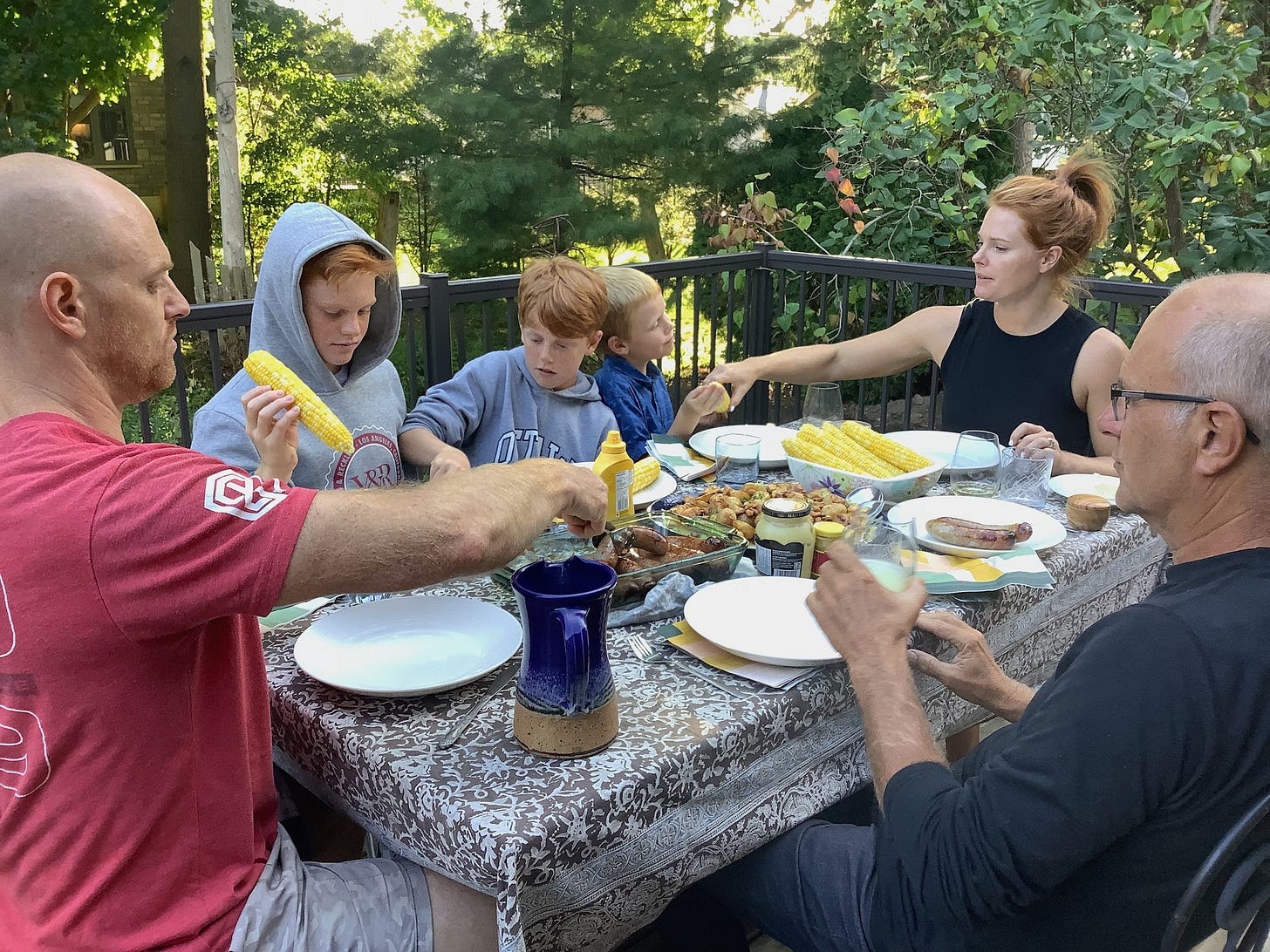You’ve heard the advice before: “Always eat dinner as a family.” There is interesting research to show that eating a meal together each day brings a family closer together, that kids thrive and get better marks, that a consistent family dinner routine correlates to greater professional success in life.
Harvard Graduate School of Education reported, “Regular family dinners are associated with lower rates of depression, and anxiety, and substance abuse, and eating disorders, and tobacco use, and early teenage pregnancy, and higher rates of resilience and higher self esteem.”
There are many pieces of parenting advice that I’ve ignored over the years, but this is one that I embraced fully. Perhaps it’s because I grew up doing it, so it came naturally. Perhaps it’s because I love to eat, so I’ll take any excuse to share good food with the people I love most. But regardless of my motivation, I’ve seen over the years just how special this mealtime is and how it offers a brief pause in an otherwise full day to talk, connect, and reflect. The older and busier my kids get, the more protective I become of this daily ritual.
Family dinner is nonnegotiable in our household. It happens every single day, unless something major comes up. We avoid scheduling extracurricular activities that could interfere with it; and if they do, we shift dinner to happen before or after. If only part of the family can sit down together, it’s better than none.
There are no devices allowed at the table (obviously). Usually, we turn off whatever music we were listening to while cooking so that we can talk undistracted. The kids set the table nicely with a tablecloth. They add candles on dark winter nights, a vase of flowers in summer. The food is placed in the centre of the table to be served family-style.
When we all finally sit down together, no one is supposed to start eating until every plate has been filled. I’ve explained to my kids that this shows respect for the cook, who has worked so hard to prepare the food and deserves to eat at the same time as everyone else. (At least, that’s how I feel, as the primary cook!)
Word Games
We wait, too, because marking the start of a meal matters greatly to me. I grew up in a religious family that always said grace, and to this day, it feels odd to me not to have a shared signal that says, “Now it is time to eat.” Instead of prayer, we have developed a gratitude game to kick off mealtime. Each person says what they’re grateful for that day. We go around the table, guests included, sharing our thoughts and feelings.
My littlest child always says the same thing: “I’m grateful for this yummy dinner and my family.” It seems that not much else matters to him—perhaps a useful lesson in priorities for all of us.
Some nights, we do a slightly more complex dinner table game called “Rose, Bud, Thorn.” Each person shares three things—something they’re happy about (think, a rose in bloom), something they’re looking forward to (a bud that’s going to flower), and something that’s upsetting or weighing on them (a metaphorical thorn).
This game is particularly useful when older kids are reluctant to talk; it draws information out of them and can lead the family discussion in a deeper, more constructive direction.
I’ve noticed that sometimes they use it to make indirect criticisms; for example, “My thorn is that you won’t let me do such-and-such a thing.” It indicates resentment, but starts a conversation that needs to happen and ends up making everyone feel better by the end—or, at least, better understood.
What’s interesting is how much the kids look forward to these games. If I forget to initiate, one of them will inevitably jump in, saying, “We have to say what we’re grateful for!” And now, even their friends ask to do it when they visit. Children crave opportunities to feel seen and heard, and a sit-down meal is a perfect chance for that.
The conversation tends to flow naturally after we go around the table, and I’ve noted that because we don’t text or communicate otherwise throughout the day, there is a genuine urge to discover what everyone was up to. Each child has novel information to share. At a time when instant updates are the norm, there’s something refreshing about saving up facts and stories to share at the end of the day when all of the family’s attention is focused on the dinner table conversation.
Other Lessons
Family dinner is a superb opportunity to teach kids manners and patience. They have to wait for everyone to finish eating before being excused from the table to help with cleanup. They can’t be annoying or rude at the table, or else they’re sent away to sit on the stairs for a few minutes in solitude until they’re “ready to be pleasant and not ruin anyone else’s dinner experience.” (Yes, that’s more or less what I say.)
It also teaches them to eat more adventurously. I’ve never made special “kid” food, so they are expected to eat whatever’s served. If they dislike something, they don’t have to eat a lot of it, but they do have to eat at least one small serving. I think that kids are more inclined to eat new foods when they see their parents enjoying them. It also ensures a balanced diet and gives a good reason to crack down on excessive after-school snacking—though my children, being the bottomless pits that they are, claim that whenever they use up one appetite, there’s another lying in wait.
Family dinner doesn’t have to be picture-perfect every night, but having some sort of predictable routine can provide comfort to a child and give you, the parent, a chance to connect and maintain clear lines of communication. As kids grow, there are fewer opportunities to spend time together and pin them down for deeper conversations, which is why I think mealtime matters more than ever. It's never too late to start a new family dinner practice—and adding in the conversation starter games make it more fun, too.
You Might Also Like:
The Profound Pleasure of Physical Tasks
3 Things: The Minimalists on social media, smartphones as ‘experience blockers,’ & a child’s delightful immersion in life
Cooking Lessons From My Mennonite Grandma
Food Notes, Week 19.23







We started doing family dinner when my son started eating solid food in January 2021. Almost three years later, we are still doing it! My husband and I always remark how much it has helped us eat better and enjoy dedicated time together. Still always working on manners with a 3.5 year old and definitely had to use the "not going to let you ruin other people's dinner" line last week, but overall we love it.
We have always done family dinner, and as the matriarch of a growing multigenerational family, we host Sunday dinner nearly every week. We always start dinner with a prayer and I guess I just wonder why you don’t? If you grew up with it why not continue? My son in law is not religious but he prays with the rest of us before we eat.
No judgement, just curious. I think you are doing a wonderful thing making your family spend mealtime together.